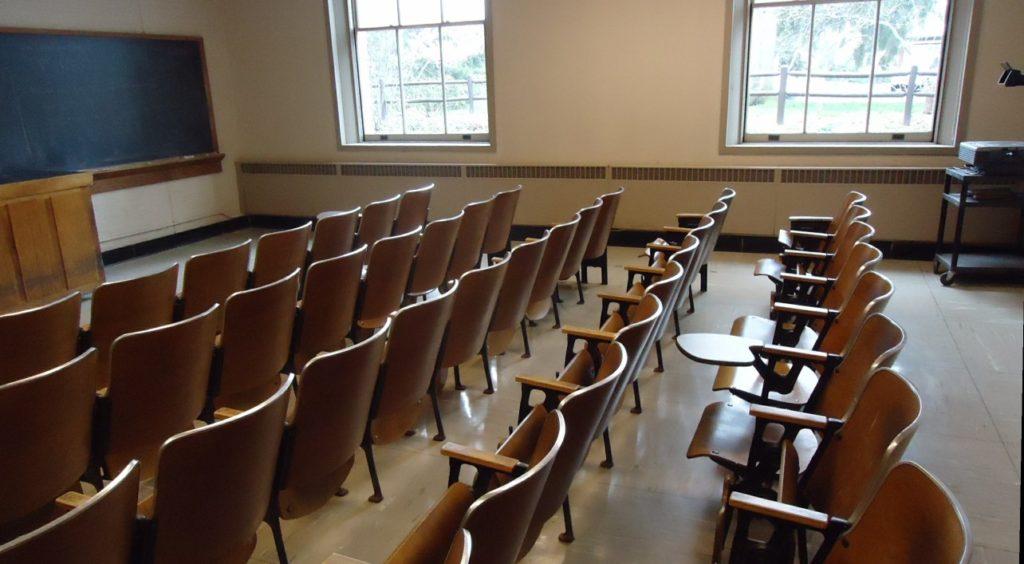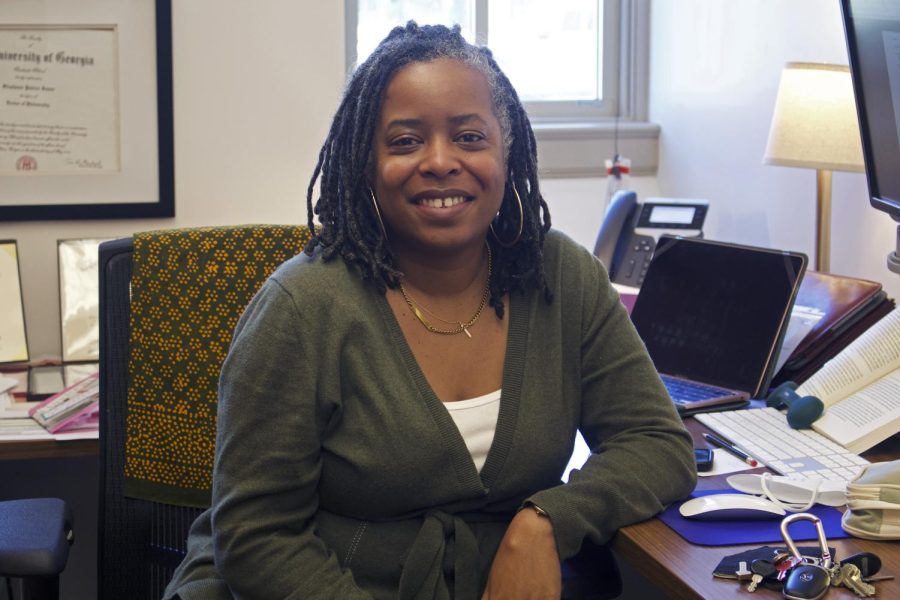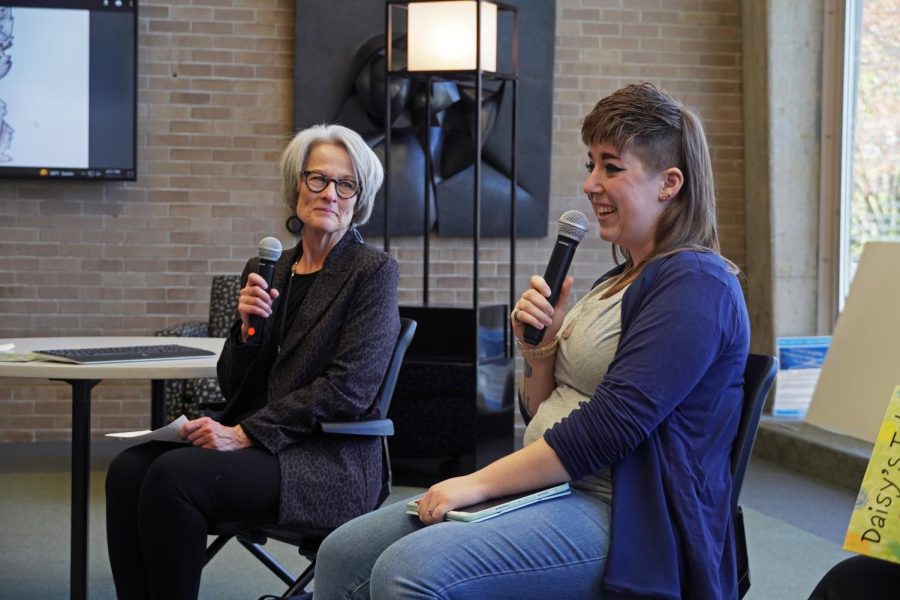In a class session of “Anthropological Inquiries” on February 13, 2020, Professor John Whittaker, anthropology, who is white, said the n-word. Whittaker employed the term as an example when speaking to the class about linguistics and taboo words.
Whittaker confirmed his use of the racial slur in a written response to an unnamed student who reported the incident. In the response, titled “Letter to an Unknown Student,” Whittaker states that his “conscience is clear.” He writes that his use of the term was educationally valid and falls within the protections of free speech and academic freedom. Whittaker concludes the letter by writing, “You should call out instances of racism and bias. This was not one.”
Errol Blackstone Jr. ’20 responded to the Letter, which has circulated online, in an op-ed titled “Response from a Black Alum to Whittaker’s Email.” Blackstone writes that he is “tired of witnessing Grinnell traumatize Black students under the guise of ‘diversity’ or the ‘civil exchange of ideas’ and calls for Whittaker’s resignation. In the piece, he responds to specific quotes from Whittaker’s letter and encourages readers to read Whittaker’s piece before his.
The S&B has published both pieces of writing below, as well as in separate articles for the public record and in the interest of public discourse. We will be following up on this specific incident, as well as other reports of racist language and behavior at Grinnell College, in further reporting. If you would like to speak with us about your experience, please email newspapr@grinnell.edu.
Letter to an Unknown Student
by John Whittaker
Dear Student,
You may or may not believe it, but I am largely on your side. However, you have accused me of insensitivity and racism because I spoke a word you object to in a class. I did not attach that word to anyone, or direct it to anyone. I spoke it in a classroom setting, to discuss and condemn it. My conscience is clear.
I don’t expect that we will end by agreeing on everything, but I would like to explain where I stand in the hope that we can work towards understanding and tolerance of other views. I believe this is part of the better world that we are both working for, one that treats all individuals and groups more justly and without prejudice. This is my form of activism, which I pursue by teaching.
First, I expect I support much of your anti-racist agenda and your activism in that cause. I support your right to criticize my teaching, and I am glad that you feel safe in doing so. However, activist movements often make the mistake of demanding ideological purity and attacking supporters who do not follow the party line closely enough. This damages allies and plays into the hands of enemies. I believe that in most things, we are allies, not opponents. If you had been in my class, I think you would understand from the readings we use and what I try to teach that we agree on most substantial political issues and how the world must be changed.
However, I do not, and will not apologize for using an offensive word in a classroom context. Some people feel that speaking a word gives it power. I feel that speaking it without fear and confronting it is a better way of robbing it of its force. We both agree that this word is one that should not exist and should not be used. I have never used it to a person or about a person, and would not. However, without regard for our feelings, ugly words do in fact exist, and if I am cowed into saying “the n-word” you nevertheless hear the full slur. Ignoring facts or trying to suppress them by intimidation is the Trumps’ way, the dictators’ way of thinking, and it doesn’t work.
You were not present in class to understand the context, and I am dismayed that you condemn me on the basis of a second-hand account. So perhaps a bit more context will help you understand what I was trying to do in class. We were discussing linguistics and taboo words. I handed out a page from Owen Wister’s The Virginian, in which the villain calls the hero a “son of a ___”. I said something like: “The word “bitch” was too awful to print in 1919, a time in which many academic texts used Latin to hide sexual references from women and children, who were felt to need protection and to be likely unable to read Latin. And so on. What are taboos today? How about “nigger”? This was always a vile word, but once common. Why is it that today, sexual words are common and barely noticed, while racial epithets are so condemned that newspapers can’t print them?” That was the discussion I wanted to have.
In this context, you also need to understand the American freedoms that protect us both. Your right to criticize me is protected by law. My right to use a word you do not like is also protected. My right to call President Trump a fool and a bigot is protected too; in some other places and times that would get me sent to prison or worse. This is part of what I think we are fighting for in this country. The right to criticize and even to insult others is a necessary part of our world, and it works both ways – Trump can call me a traitor, I can call him a disgrace, and we are both within our rights. You can fight for change, using harsh language against those you disagree with, as you have done with me. But the college has the right to punish speech acts only when they turn into personal attacks and harassment, which may not be in fact illegal, but which are unacceptable in our social setting. I have done nothing of the sort.
As a student, you are here to face new ideas, different people, and sometimes uncomfortable social and intellectual situations. If you are afraid of frank discussion of evil words and other unpleasant realities in the safe space of a classroom, with a professor who explicitly condemns the word and is outspokenly sympathetic and on your side in most of the political issues that concern you, how can you possibly learn to bear up under the stresses of an often hostile world?
The principles of free speech must be absolute and sacrosanct at an institution of higher learning, and in intellectual discourse generally. I will quote the handbook page to which Dean Harris referred me: “Liberal education cannot take place without the free, open, and civil exchange of ideas.” I do not hide behind this protection, but I assert it as a matter of principle. And this is why: I teach anthropology, which covers many things that are uncomfortable to many people. I do not try to be offensive in my teaching, though sometimes provocative. But merely teaching an idea or fact or stating your opinion is offensive to some. If I fear to offend by using a word, then I should also curb my tongue and not teach the principles and facts of evolution, deeply offensive to some friends of mine who know I will go to hell and have tried to convert me. I cannot teach that other religions are as worthy of respect and understanding as ‘American’ Christianity, because that too confronts some people’s beliefs. I must fear to show a film that depicts violence, or one in which an animal is killed and eaten. These are unpleasant realities that some want to hide from. I am sympathetic and inclusive in discussing variation in kinship and marriage rules in different cultures, but there is no way you can talk about sex, and no way you can explain marriage, without the potential to offend someone who believes that only one kind of marriage or sexuality is right or that use of the word ‘vagina’ is obscene or that I used the wrong pronoun. If I fear to offend, I should stop condemning the Confederates, because unfortunately they still have supporters who might attack me, and descendants who are decent people and think their ancestors were honorable. I should not mark a swastika on the board as I discuss the horrors of Nazi Germany and the symbols they usurped from prehistory, because that particular symbol is offensive. And I could find a hundred more examples.
I reject any suggestion that I have caused real harm beyond discomfort to anyone by using a nasty word in an academic discussion. I dispute the apparently fashionable belief that challenging students in the classroom and sometimes offending them results in “harm.” In my teaching, I regard some explanation of the principle of free speech and civil discussion with respectful disagreement as a duty, since these are principles critical to a liberal education, and very relevant as our society struggles against oppression. A climate of suppression from either “liberals” or “conservatives” is damaging to what we aspire to as teachers and the country we want as citizens. Protesting in the streets today is partly about making heard the voices of those who are silenced by a racist climate. This cause is not advanced by attempting to silence allies.
Yes, you should agitate for a better world, and you should call out instances of racism and bias. This was not one.
Sincerely,
John Whittaker, Professor
Response from a Black Alum to Whittaker’s Email
By Errol Blackstone Jr. ’20
After reading Whittaker’s response, I was disgusted and mortified. The amount of arrogance that this white man carries is truthfully scary. He felt so emboldened by Grinnell College and an environment cultivated by white academia that he poorly quotes academic freedom in his defense.
“Academic freedom does not give teachers unlimited freedom in the classroom.” These aren’t my words but the words from Principles of Academic Freedom in the Faculty Handbook. Whittaker’s brazen stance on his entitlement to say “nigger” strays far from the classroom setting and his research. In fact, his stance falls under harassment according to Grinnell College Discrimination and Harassment Grievance/Complaint Procedure.
I am tired of the excuses for blatant racism committed at this college. I am tired of witnessing Grinnell traumatize Black students under the guise of “diversity” or the “civil exchange of ideas”. Enough is enough … I cannot address everything in Whittaker’s email, so I keyed in on specific quotes. I encourage everyone to read through his original email before reading my analysis.
“I support your right to criticize my teaching, and I am glad you feel safe in doing so. However, activist movements often make the mistake of demanding ideological purity and attacking supporters who do not follow party lines close enough…”
No one mentioned activism or “party lines”. There is a tendency to take the experiences of BIPoC and transform it into political arguments. Stop erasing and construing our experiences! This student wants you to be held accountable for using a slur in a classroom setting. That is not asking for ideological purity. That is asking for the bare minimum.
“I do not and will not apologize for using an offensive word in a classroom context. Some people feel that speaking a word gives it power. I feel that speaking it without fear and confronting it is a better way of robbing it of its force.”
You admit that “nigger” is an offensive word, and you are grown enough to know the history of this word. Yet, you show no remorse for abusing your whiteness and status as a tenured professor to say this word. You as a white man cannot reclaim a racial slur. You do not get to decide how to rob the n-word of “its force” because this force cannot be used against you. This argument leads me to believe that you have used slurs outside of class and in many different contexts. That is the only way this argument can stand…
“What about taboos today? How about ‘nigger’? This was always a vile word, but once common. Why is it that today, sexual words are common and barely noticed, while racial epithets are so condemned that newspapers can’t print them?”
Firstly, the fact that you typed out the n-word in response to someone calling you out on saying the n-word is appalling. Secondly, the argument you presented lacks the much-needed nuance and tact that a professor of your caliber should have. The lack of intersectionality when considering this question (because Black women exist experience sexual and racial slurs) is concerning. You are essentially pitting two marginalized communities against each other in this argument (women vs. Black people), which is a problem. Furthermore, this question lacks the depth or inspiration that you think it might have. This isn’t a new argument. This argument is brought up by racist white people who want to sing “nigger” to every song. Honestly, the way you laid out the context of this issue does not help your case.
“In this context, you also need to understand the American freedoms that protect us both. Your right to criticize me is protected by law. My right to use a word you do not like is also protected. My right to call President Trump a fool and a bigot is protected too; in some other places and times that would get me sent to prison or worse.”
This is where your argument leaves the range of academic freedom under Grinnell policy and that of the American Association of University Professors (AAUP). Academic freedoms in the classroom can only relate to class subjects and your response on politics does not fall under that. This email response is completely out of the classroom setting. Additionally, Grinnell College is a private institution. Freedom of speech limits the government from censoring its citizens. The way you have conflated freedom of speech to fit your argument is simply incorrect. Also, freedom of speech is not as protected as you think. In fact, a lot of activists in this country have been targeted by this government (many have risked their lives). Regular citizens (especially Black citizens) are attacked for utilizing their freedom of expression. In academia, this translates to tone policing and reprimanding of students who call out racist structures (which you are actively being a part of right now). Putting “American freedoms” at the forefront of your argument (and not human decency or respect) is a very Westernized viewpoint and is a gross display of your poor character.
“…the college has the right to punish speech acts only when they turn into personal attacks or harassment, which may in fact not be illegal, but which are unacceptable in our social setting. I have done nothing of the sort.”
You are right about the college’s rights, but what you did and what you continue to do with this response IS harassment. Refer to Grinnell College Discrimination and Harassment Grievance/Complaint Procedure. Now, your tenure may protect you; however, please do not speak about “harassment” when you have not read Grinnell’s policy on it.
“If you are afraid of frank discussion of evil words and other unpleasant realities in the safe space of a classroom, with a professor who explicitly condemns the word and is outspokenly sympathetic and on your side in most of the political issues that concern you, how can you possibly learn to bear up under the stresses of a hostile world?”
No one is “afraid”. What you are doing and the way you are defending yourself is unacceptable. How can you “explicitly condemn” a word that you just argued the defense of using? These comments are extremely gaslight-y and ignore the experiences of people who have chosen to hold you accountable for your actions. You haven’t even apologized! Finally, how can you talk about a “hostile world” as a white professor to a student of color; especially when the issues you’re bringing up are directly tied to RACE? People of color learn about racism from their birth in this society. White people learn about racism through higher education. The realities PoC face are significantly worse than whatever “hostile world” you can imagine. This comment along with this entire email response is condescending and ignorant.
“I do not try to be offensive in my teaching, though sometimes provocative, but merely teaching an idea or fact or stating your opinion is offensive to some. If I fear to offend by using a word, then I should also curb my tongue and not teach the principles and facts of evolution…”
Impact vs. Intent: although you “do not try to be offensive in [your] teaching” it is evident that you have been and continue to be offensive. The fact that you’re comparing your unfounded claims of freedom of speech to unfounded claims of religious freedom is telling. Additionally, you’re co-opting the movements of so many marginalized communities that you do not belong to. The reality is: you do not care about these movements or the people that have spearheaded them. You feel entitled to say “nigger”, and you are trying to use their fights to justify yourself.
“I should not mark a swastika on the board as I discuss the horrors of Nazi Germany…”
Wait… are you drawing out swastikas on boards during class? You can easily show a picture of a swastika and still teach the history of Nazi Germany. So, there is a list of things you are doing incorrectly. What happens if you forget to erase the swastika after class? What about the Jewish students in your classes that might not be comfortable with this? I know I’m not comfortable with a professor casually drawing swastikas for class. Do you think that drawing swastikas lessens “its force”? How far does this go? There are genuine consequences for your actions, and you are too self-centered to consider them.
“I dispute the apparently fashionable belief that challenging students in the classroom and sometimes offending results in ‘harm.’”
Offending someone with words can harm them emotionally or mentally, which is an actual form of harm. Either way, your teaching shouldn’t aim to “sometimes offend” your students. And I can tell from this response and the ideas that you have proposed in this email that you are not challenging students in any worthwhile way.
“Protesting in the streets today is partly about making heard the voices of those who are silenced by a racist climate. This cause is not advanced by attempting to silence allies…”
Once again you are co-opting a movement. You, as a cis-straight white man, cannot determine what makes “this cause” effective or valuable. Allies shouldn’t have to be told to be silent. They should quiet themselves, listen to the marginalized people that lead the movement, and then act based on what they listened to. You are not an ally to any of the movements that you’ve mentioned in this email.
“Yes, you should agitate for a better world, and you should call out instances of racism and bias. This was not one.”
In conclusion, the only sound argument you have made in this response is the writing of your name. You have shown your sense of entitlement as a white man and proved that any classroom that you have cultivated in the past did not encourage anti-racist structures. Despite the many accolades that white academia has given you, you are not qualified to teach at Grinnell College or (in my opinion) any higher learning institution. The consistent condescending nature of this email (which is addressed to a student) and the inherited power professors have over students prove that you cannot provide a “safe” learning environment. You should be ashamed of yourself, and I hope whatever bad karma you have whipped up over your teaching career will culminate in the near future. At this point, an apology is not needed of you but a resignation.
























































Mechelle Dhondt • Sep 22, 2020 at 4:19 pm
The alum who used his time to point out to Professor Whitaker why his use of language was offensive should be commended.
While reading Whitaker’s statement I felt the urge to yell “stop” as he continued to dig a deeper hole with each point he raised. I was particularly struck when Whitaker “mansplains” how the offended students will have difficulties bearing up in a hostile world.
It would be educational to see Whitaker leave the cocoon of his classroom and enter the real world where he is unprotected by college policies. While the world will not be as tough on an entitled white man, he is still sure to draw the ire of some portion of America who will not have to accept his condescending attitude. Then we will see who can take the hard knocks of a hostile world.
Mechelle Dhondt • Sep 22, 2020 at 4:08 pm
The alum who took the time to try to show Mr. Whitaker why his use of language is offensive should be commended. I hope the use of your time proves fruitful.
While reading Whitaker’s statement I felt the urge to shout “Stop” as he dug a deeper and deeper hole for himself. I was partucularly struke when Whitaker “mansplains” how the students who were offended will have difficulties bearing up in a hostile world. It would be good to see Whitaker leave the coccoon of his classroom status, walk across the protected space of the campus and enter the real world. While it certainly will not be as hostile to an entitled educated white man, his condescending attitude will surely draw the ire of some portion of America. Then we will see who can take the hard knocks of a hostile world.